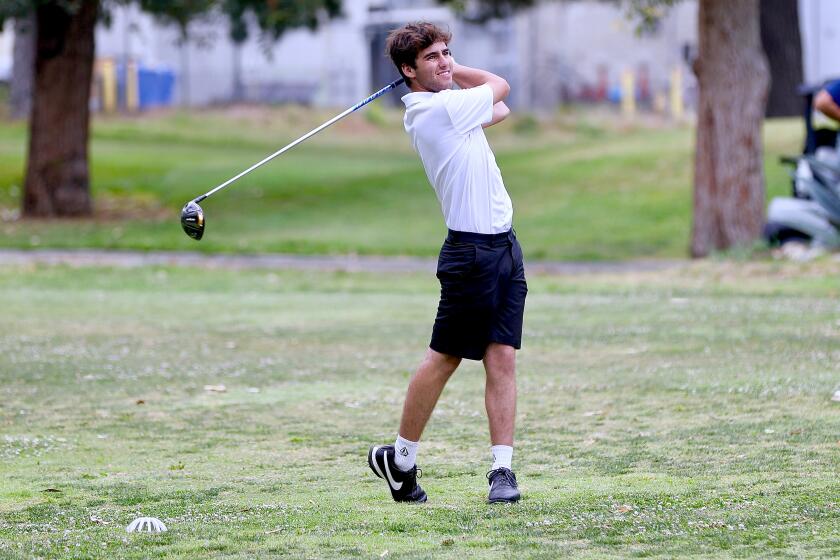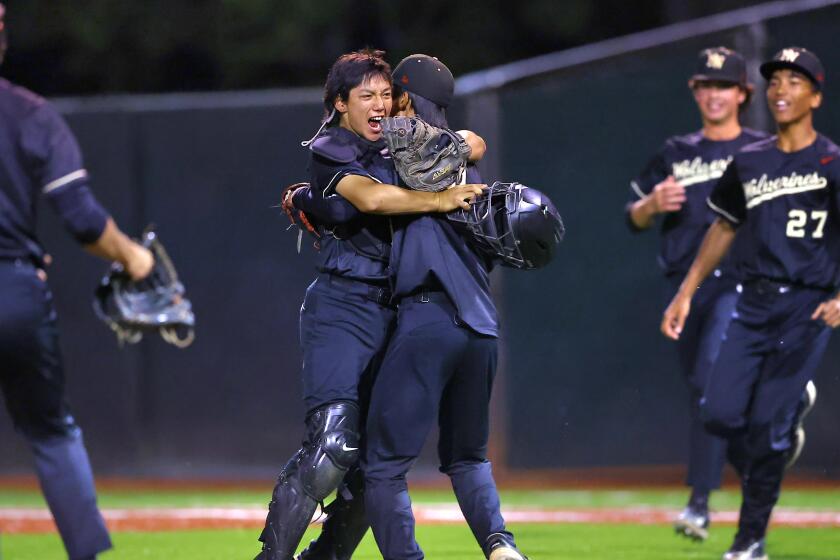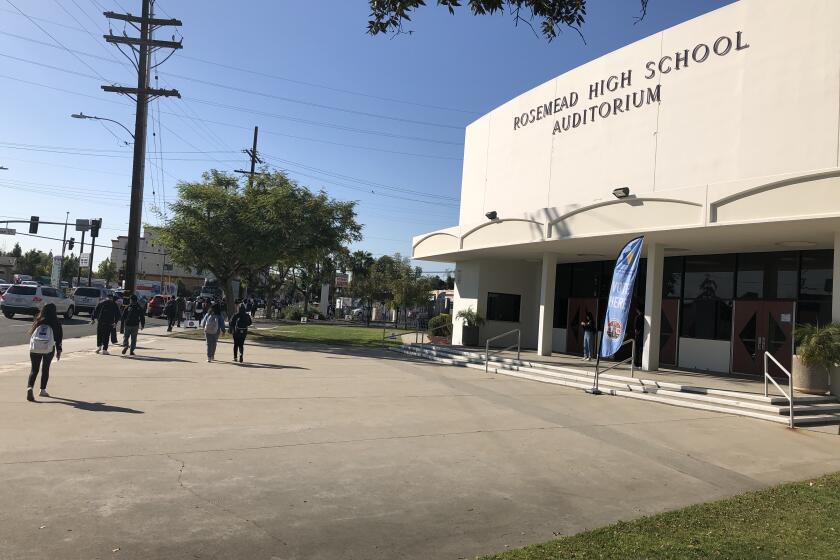Legally Blind Wrestler Insists That He Is Neither Different Nor Special : Victor Hakopian Is Hard to Pin Down
What matters to Victor Hakopian is that he is a very good wrestler. What is important is that he can bend an opponent’s body, subdue an opponent’s mind, by using his strength, knowledge and will.
What he is proud of is his 37-7 record at 148 pounds this season at Anaheim Canyon High School. And that he leads Canyon, the No. 1-ranked team in California, in pins with 28.
Those things are important and real.
The other things--the questions that bore him, the sympathy he doesn’t want, the handicap he doesn’t recognize--are distractions, to be treated with the same disdain as the people who consider him different or special.
Being different only brought the laughter of grammar school kids who made fun of his crossed eyes, unaware that those eyes had undergone surgery more than 10 times before he was 8.
Being special only allowed people to make excuses, and tell him what he couldn’t do. Protect the blind boy.
But Victor Hakopian isn’t blind, as he will tell you with considerable force. He is legally blind. But he can see shapes and shadowy outlines. He can read books through the use of an enlarger, and watch television.
It was television that introduced Victor Hakopian to wrestling.
“I’d watch professional wrestling on TV and I thought it was great,” he said. “I got all excited and started practicing flying body slams. I decided then that I’d go out for the wrestling team at school.”
That was last school year. Hakopian was a sophomore at La Mirada High--he transferred to Canyon after his family moved to Anaheim last summer.
When he showed up for the first day of practice, he was surprised to learn that high school wrestling was done on a mat, not in a ring; that there were no tag teams, and that wrestlers were not allowed to bash each other with folding chairs.
“I was kind of bummed,” he said. “I thought it was going to be just like on Channel 9. But I figured I was there so I might as well try.”
Which is something others would have preferred he didn’t.
“I was scared at first,” said Tamara Hakopian, Victor’s mother. “I really didn’t want him to do it. Wrestling is such a tough sport, especially for someone with Victor’s problem.”
Hakopian was born without an iris in either eye, which made them extremely sensitive to light. For five years, beginning at the age of 2, his life was a merry-go-round of doctors’ offices and operating rooms. And the result was always the same--disappointment.
There were monthly visits to San Francisco for a year and a half, which produced little except to put him a year behind in school.
The doctors tried but succeeded only in building up pressure on his eyes. By age 7, Victor Hakopian had developed glaucoma.
The doctors finally gave up. Hakopian wound up with limited vision in his left eye and almost none in his right.
“My goodness, there were 10, 12, I don’t know, maybe more operations,” said Harry Hakopian, Victor’s father. “I guess I lost count. And after all of it, the doctors told us there was nothing else they could do. That Victor’s condition was not curable. Glasses, surgery, nothing. That was the end of it.”
Tragic and final as it all sounds, Victor says he was relieved when it was over.
He played sports around the house with brothers Edward and John, each of whom distinguished himself in high school athletics.
By the time he got to high school, Victor was looking for a sport to call his own. Then one Saturday morning, he turned on the television set . . .
“A lot of people were worried about me when I first went out for the team,” he said.
Their fears were seemingly confirmed when Hakopian was pinned in 30 seconds in his first match.
“It sounds weird, but I loved it,” he said. “I knew right then if I worked at it, I could be good at it.”
He began tackling friends and relatives on the living room rug and slapping them into whatever new hold he had learned. He began to run four to five miles at night, which caused some concern for his safety.
“Some people wanted me to quit, but you’ve got to risk it once in a while,” he said.
“Sure, I wish I could just pick up a book, sit back in a chair and read without a machine to help me. Sometimes I wish I could just jump in a car and drive away. But I can’t. OK. But there are a lot of things I can do. No one is going to stop me from doing them.”
No one has. He is seeded fourth at 148 pounds in the Southern Section’s 4-A divisional tournament at West Covina Edgewood this weekend. He got there by placing second in the Century League meet.
Earlier in the year, he finished fifth in the Five Counties tournament, considered second only to the state tournament for competition and prestige.
His success has not surprised Gary Bowden, the Canyon coach, but he does admit that he was a bit apprehensive, about coaching someone like Victor.
“When you meet Victor, you almost immediately sense that pride is his motivating force. Wrestling is his outlet to channel a lot of his desires. He’s not self-conscious and won’t let it get in his way. That puts you at ease pretty quickly.”
Hakopian, now a junior, says his wrestling has improved a lot since the early days at La Mirada. Where he used to rely on strength, he know uses technique, he said.
With his growth has come a reputation for being a very good wrestler.
Naturally, opponents want to beat him, and there are theories on how they should go about it. Harris Oishi, Canyon assistant coach, has noticed a tendency by Hakopian’s opponents to try to stand up and use his lack of vision against him.
“Once Victor has someone in a hold, he doesn’t really need his vision,” Oishi said. “He can feel for holds.”
In fact, other Canyon wrestlers often practice wearing blindfolds to improve their sense of touch.
“But when the two wrestlers are apart, that’s where he is vulnerable,” Oishi said. “His opponent will attempt to get out of his vision or shoot into him. Because of Victor’s vision problems, his reaction to something like that is going to be slow, and that’s where he can get hurt.”
But, at least on one occasion, Victor’s handicap was an advantage. Bowden remembers a match in which Hakopian’s opponent, having heard of Victor’s prowess, had worked himself into a frenzy.
“This guy was going crazy, he wanted Victor,” Bowden said. “He knows that if he beats Victor he makes a name for himself.”
So the two went onto the mat, and just before the match was about to begin, the referee mentioned Hakopian’s vision problem to the charged up opponent.
“The kid’s face just dropped,” Bowden said. “I guess he didn’t know. Victor pinned him in about a minute. When the kid got up, he told Victor what a great guy he thought he was.”
A great guy? Well Victor Hakopian might have a little trouble with that.
“I’m not better or worse than anyone else,” he said. “People always ask the same questions about my vision and my wrestling. It gets pretty boring. But I tell them it’s no big deal and neither am I.”
Get our high school sports newsletter
Prep Rally is devoted to the SoCal high school sports experience, bringing you scores, stories and a behind-the-scenes look at what makes prep sports so popular.
You may occasionally receive promotional content from the Los Angeles Times.



